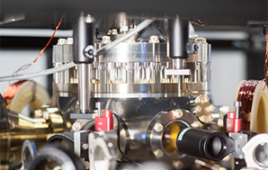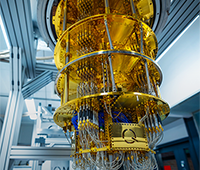We believe quantum computing may help solve some of the most challenging computer science problems, particularly in machine learning. Machine learning is all about building better models of the world to make more accurate predictions. If we want to cure diseases, we need better models of how they develop. If we want to create effective environmental policies, we need better models of what’s happening to our climate. And if we want to build a more useful search engine, we need to better understand spoken questions and what’s on the web so you get the best answer.
So, on March 16, 2013, we launched the Quantum Artificial Intelligence Lab. NASA’s Ames Research Center will host the lab, which will house a quantum computer from D-Wave Systems, and the USRA (Universities Space Research Association) will invite researchers from around the world to share time on it. Our goal: to study how quantum computing might advance machine learning.
Machine learning is highly difficult. It’s what mathematicians call an “NP-hard” problem. That’s because building a good model is really a creative act. As an analogy, consider what it takes to architect a house. You’re balancing lots of constraints — budget, usage requirements, space limitations, etc. — but still trying to create the most beautiful house you can. A creative architect will find a great solution. Mathematically speaking the architect is solving an optimization problem and creativity can be thought of as the ability to come up with a good solution given an objective and constraints.
Classical computers aren’t well-suited to these types of creative problems. Solving such problems can be imagined as trying to find the lowest point on a surface covered in hills and valleys. Classical computing might use what’s called “gradient descent”: start at a random spot on the surface, look around for a lower spot to walk down to, and repeat until you can’t walk downhill anymore. But all too often that gets you stuck in a “local minimum” — a valley that isn’t the very lowest point on the surface.
That’s where quantum computing comes in. It lets you cheat a little, giving you some chance to “tunnel” through a ridge to see if there’s a lower valley hidden beyond it. This gives you a much better shot at finding the true lowest point — the optimal solution.
We’ve already developed some quantum machine learning algorithms. One produces very compact, efficient recognizers — very useful when you’re short on power, as on a mobile device. Another can handle highly polluted training data, where a high percentage of the examples are mislabeled, as they often are in the real world. And we’ve learned some useful principles: e.g., you get the best results not with pure quantum computing, but by mixing quantum and classical computing.
Can we move these ideas from theory to practice, building real solutions on quantum hardware? Answering this question is what the Quantum Artificial Intelligence Lab is for. We hope it helps researchers construct more efficient and more accurate models for everything from speech recognition, to web search, to protein folding. We actually think quantum machine learning may provide the most creative problem-solving process under the known laws of physics. We’re excited to get started with NASA Ames, D-Wave, the USRA, and scientists from around the world.



